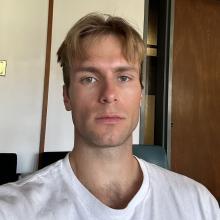Adam Sunavsky
Why did you decide to pursue a graduate degree?
I knew I wanted to continue with research after working with some truly inspiring mentors during my undergraduate and Master's degrees. I realized my particular interests lay at the nexus of research and medicine, making the integrated MD/PhD program at UBC an ideal path. This program is specifically structured to train students at identifying pressing medical challenges in the clinic and then applying scientific principles to develop innovative solutions. I am particularly interested in using machine learning and neuroinformatics models to understand and personalize depression treatment; a graduate degree gives me the time and resources for this translational research.
Why did you decide to study at UBC?
UBC offers the best of all worlds. It is a world-renowned university surrounded by sublime natural beauty that offers an incredible range of activities. Having studied in both Ontario and Nova Scotia, I can say that UBC's strengths across so many fronts are what ultimately drew me in. There's nothing quite like going to the beach for a summer sunset or spending winter weekends snowboarding in Whistler. This environment keeps me motivated in my academic pursuits.
What is it specifically, that your program offers, that attracted you?
A key draw to UBC's program was the chance to work under the mentorship of Dr. Fidel Vila-Rodriguez in the Non-Invasive Neurostimulation Therapies lab. The lab and graduate program in neuroscience provide access to state-of-the-art MRI machines and technologies. Through collaborative lab partnerships, I have access to large datasets that help me answer my research questions with confidence. As well, the interdisciplinary nature of the neuroscience program encourages broad collaborations, bringing together diverse perspectives that are necessary for truly impactful research.
What was the best surprise about UBC or life in Vancouver?
I remember my first time visiting Vancouver during my undergraduate degree for a rowing competition. I was utterly blown away by the seamless blend of urban life with natural beauty. The city is surrounded by mountains and beaches. From that visit, I knew that Vancouver was where I belonged, and I feel incredibly fortunate to call it home now. Since moving, the ease of access to outdoor activities has continually amazed me. As an avid soccer player, I have the added benefit of being able to play my sport outside year-round!
What aspects of your life or career before now have best prepared you for your UBC graduate program?
My foundational degrees, a Bachelor of Science in Psychology at Queen's University and a Master of Science in Medical Neuroscience at Dalhousie University, were instrumental. They gave me a strong understanding of both human behaviour and the neural underpinnings of health and disease. My diverse research experience, spanning from the neurobiology of chronic low back pain to the neural correlates of creativity, has equipped me to adapt to different research fields.
What do you like to do for fun or relaxation?
Outside of research, I take full advantage of Vancouver’s natural playground—whether it’s playing soccer, snowboarding in the mountains, hiking scenic trails, or enjoying beachside sports. I also enjoy creating educational content on YouTube in my spare time.
What advice do you have for new graduate students?
My biggest piece of advice is to focus on balance and take things one step at a time. Grad school is a marathon, not a sprint, and the demands can quickly become overwhelming. For me, maintaining that balance means hitting the gym or the soccer pitch after a long day of work. It is also important to choose a research topic that you are passionate about and find the right mentor to guide you; this will make the whole experience more enjoyable. Finally, put yourself out there - research collaborations can be incredibly fruitful and can lead to lifelong friendships within the academic community!
Learn more about Adam's research
My research investigates how repetitive transcranial magnetic stimulation (rTMS) reshapes brain aging patterns and large-scale neural dynamics in individuals with treatment-resistant depression. By using brain age estimation and whole-brain simulations, I explore how the brain adapts, both structurally and functionally, in response to rTMS. My work integrates neuroinformatics, machine learning, and biophysical modelling to identify biomarkers of treatment response and advance personalized approaches for depression treatment.

